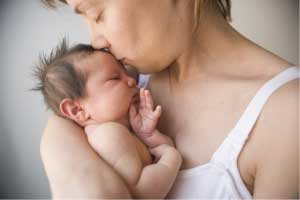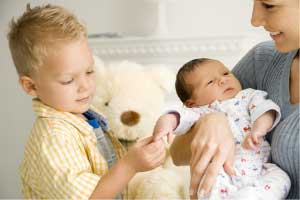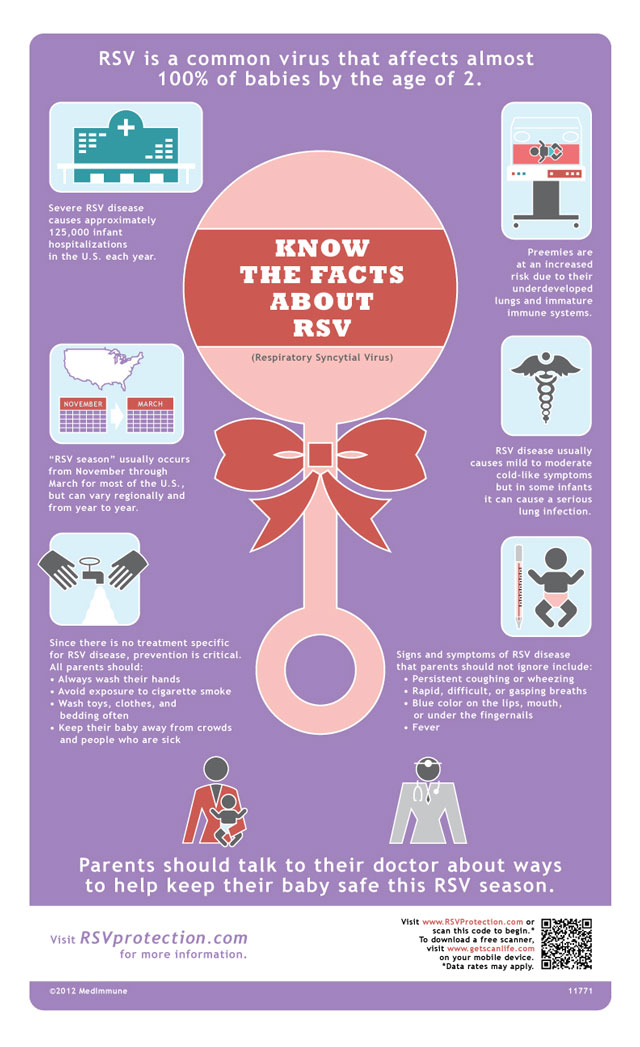![]() Now that I'm a mom, I can't even begin to imagine what I'd do without my daughter. If anything were to happen to her, I know that it would break me. Moms form such strong bonds with their children, beginning in the womb, yet there is a silent enemy out there which threatens to break that bond and bring serious injury to your newborn. I want to share more information with you about a potentially life-threatening risk to babies called RSV disease.
Now that I'm a mom, I can't even begin to imagine what I'd do without my daughter. If anything were to happen to her, I know that it would break me. Moms form such strong bonds with their children, beginning in the womb, yet there is a silent enemy out there which threatens to break that bond and bring serious injury to your newborn. I want to share more information with you about a potentially life-threatening risk to babies called RSV disease.
|
|
|
Life as a new parent is joyous and celebratory. In most cases, parents cannot wait to introduce the new baby to friends and family. But sometimes exposure to loved ones also means exposure to germs. Young infants are very susceptible to infection in the early weeks of their lives, so contracting something as small as the common cold can present danger. This is especially true for babies born early, because they have underdeveloped lungs and immature immune systems.
One of the biggest threats to new babies is a very common virus called respiratory syncytial virus, or RSV. This virus is of special concern because it’s extremely common and spreads very easily. RSV can live on surfaces (e.g., doorknobs, countertops, toys, bedding) for several hours and is often spread through touching, hugging and kissing.
Because of this, almost 100% of children contract RSV by their second birthday. In most older children, RSV runs its course with mild symptoms similar to the cold or flu, and many parents may not even know their child has the virus. But in very young babies—and especially preemies and those with certain lung and heart diseases—it can lead to a serious respiratory infection.
Because of these dangers, parents of new babies need to be cautious about exposing infants to visitors. But communicating your concern to family and friends eager to meet your new child is difficult. It is a struggle to be appreciative of people’s excitement and wary of their contact.
As a guest, it is your responsibility to know how to act and prepare for a visit. It is important to remember that babies are susceptible to germs, so physical contact can be risky. Always wash your hands, ask before you touch a baby, and stay away if you have been sick recently.
And if the new parents aren’t ready for visitors, remember that their concerns are valid and don’t be offended. There are other ways to show support of families with newborns (e.g., laundry duty or bringing dinner), while respecting the parents’ efforts to keep their baby safe from germs during their first few vulnerable months.
A few tips to remember when a loved one has a new baby:
- Call before you visit. New parents need time to set up a routine and bond. By giving them time to do so before you visit, you are respecting the new family.
- Postpone a visit if you feel that you may be getting sick, have recently been ill or exposed to illness.
- Remember that parents know best. If you feel they are being overprotective or overly cautious, just consider that only they know what’s best for the health of their new son or daughter.
- Offer to do something to ease their responsibilities as they spend time as a family, such as laundry, cooking or dishes. Sleep-deprived moms and dads will appreciate your help!
If you do schedule a visit with a new baby:
- Wash your hands frequently—upon entering the home and especially prior to holding the baby. Parents, and the new baby, will appreciate it.
- Leave toddlers at home, especially during the winter months. Young children, especially if they attend day care or preschool, often carry germs and viruses, like RSV, that are easily spread.
A few facts about RSV that all parents, caregivers and loved ones should know:
- Almost every baby will contract RSV by age 2, but only 1/3 of moms say they've heard of the virus.
- Serious RSV infection is the leading cause of infant hospitalization, responsible for more than 125,000 hospitalizations and up to 500 infant deaths each year.
- RSV occurs in epidemics each fall through spring. The CDC has defined “RSV season” as beginning in November and lasting through March for most parts of North America.
- There is no treatment for RSV, so it’s important for parents to take preventive steps to help protect their child (e.g., wash hands, toys, bedding frequently; avoid crowds and cigarette smoke).
- Certain babies are at an increased risk of developing serious RSV infection, so it’s important to speak with a pediatrician to determine if a baby may be at high risk for RSV, and discuss preventive measures.
- Symptoms of serious RSV infection include: persistent coughing or wheezing; rapid, difficult, or gasping breaths; blue color on the lips, mouth, or under the fingernails; high fever; extreme fatigue; and difficulty feeding. Parents should contact a medical professional immediately upon signs of these symptoms.
Visit RSVProtection.com and follow #RSVProtection on Twitter for more information.
Disclosure: I wrote this review while participating in a campaign for Mom Central Consulting on behalf of MedImmune and I received a promotional item to thank me for my participation. |
I'm a former 7th grade Science teacher turned stay-at-home mom that lives in Houston, Texas. I am married to my college sweetheart and have a beautiful daughter named Riley, who definitely keeps me on my toes! I am also involved in starting a small business which would both manufacture and sell an invention that I've patented, called Toothpaste 2 Go. I love interacting with my readers and hope to learn as much about you as you learn about me!
Melissa @ Mommy Living the Life of Riley!
Add Melissa Cleaver to your LinkedIn Network
Add Mommy Living the Life of Riley to your Google+ circle |












